Understanding the purpose of mulch can make your landscaping projects much easier. Mulch improves your soil, prevents weeds, and helps your yard look great! Best of all, you don’t have to worry about hauling heavy bags of mulch from the store. Instead, a truck can bring a large amount right to your driveway.
If you are ready to order mulch from Glover Nursery, you can visit our Delivery Request Form. For those of you who need a little more information before you are ready to order a literal ton of mulch, keep reading!
Bulk Mulch Delivery Utah
Glover Nursery offers bulk product delivery to select cities in Utah. Delivery fees vary based on location. Delivery pricing details are on the request form listed by area. Once we receive your request, we’ll contact you to finalize pricing, including taxes, and schedule your delivery.
Depending on our availability and time of year, we do offer same-day delivery for orders that are confirmed by 12 p.m. Please note that same-day delivery is not always available from March – June.

What is Mulch?
Mulch is a layer of material spread on the ground in gardens and landscaping. It helps keep soil moist, controls weeds, and makes your yard look nice. You can use many things as mulch, like wood chips, leaves, cover crops, or straw. Mulch also keeps the soil warm in winter and cool in summer.
Organic mulches
Include organic matter which breaks down over time. Organic mulches assist in improving soil structure, increase fertility in edible plants, increase moisture retention, and reduces weeds. They do require refreshing as material breaks down.
Inorganic mulches
This category includes rock, weed barrier fabric, rubber mats, or chat. These require less maintenance overall, but can be detrimental to the soil and plants in or near them as they don’t easily allow for air exchange, which can increase the heat index of an area.
Which Mulch is Best for Utah Landscaping?
Utah’s climate can be tough on plants. You want mulch that holds moisture and stands up to the heat. The three types of mulch that we carry at Glover Nursery are compost, bark, and rock. Based on your soil type, landscaping style, and watering preferences, there’s a perfect match for you.
Once you’ve selected your perfect mulch, input the dimensions of your space in our mulch calculator, then submit your request for bulk delivery! We offer same-day delivery, first come, first served, when orders are placed before 12 PM MT, depending on the time of year.
Compost

Compost is a nutrient-rich, decaying organic matter like manure, leaves, food scraps, and grass clippings. It’s commonly used to improve soil quality, either spread in a thin layer on top or tilled into the top few inches.
Benefits of Compost:
- Provides immediate nutrient availability for plants
- Increases organic matter in the soil
- Balances soil pH
- Improves drainage in heavy soils
- Enhances moisture retention in sandy soils
Considerations:
- Compost breaks down over time, so it needs periodic replenishment
- High nitrogen content in some composts can burn plants, particularly in hot weather
- (Our compost has been properly finished, so this is not a concern with compost purchased from Glover Nursery)
Bark Mulch
Bark mulch is an organic covering that doesn’t offer direct nutritional benefits but serves as an effective mulch. It’s available in various textures and colors, providing flexibility for different landscaping styles.
Benefits of Bark Mulch:
- A wide variety of textures (fine, shredded, chipped, or nugget)
- Available in natural and dyed colors (brown, black, red)
- Most products are preservative-free
- Helps retain moisture by shading the soil
- Reduces weed growth and makes weeds easier to pull
Considerations:
- Doesn’t decompose quickly, so it’s not ideal for soil amendment
- Can fade in direct sunlight and may need refreshing
- Lightweight bark can blow out of beds during strong winds
Rock Mulch
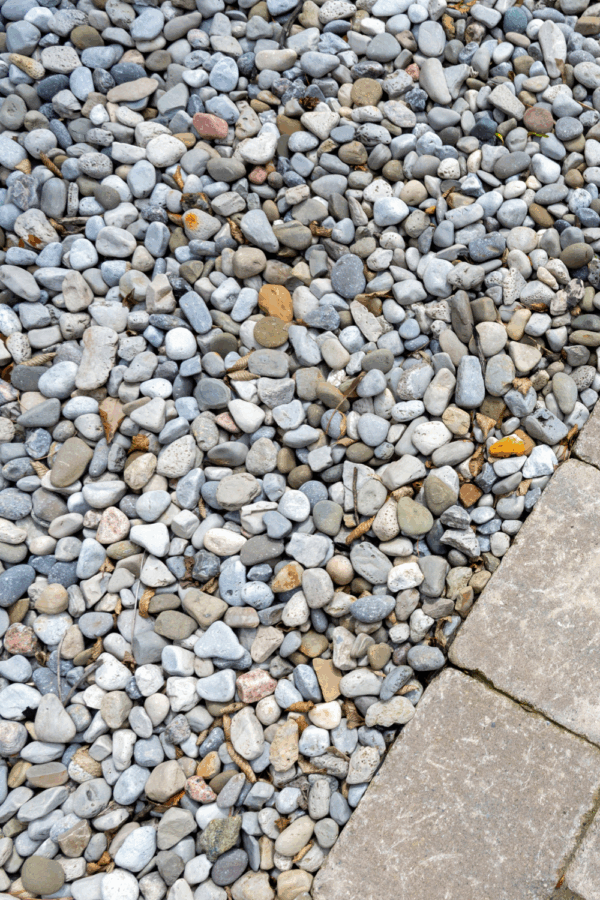
Rock mulch consists of small, round, or angled stones spread over native soil or weed barrier fabric.
The purpose of mulch in this context serves both decorative purposes—such as filling dry riverbeds or surrounding ponds—and functional ones, like securing the weed barrier in place.
Benefits of Rock Mulch:
- Low maintenance once installed
- Doesn’t need to be replaced frequently like organic mulches
- Keeps a clean, organized appearance for years
- Comes in a variety of colors, sizes, and textures
Considerations:
- Higher initial cost
- Heavy and difficult to install or remove
- Creates added work when installing new plant material
- Doesn’t prevent weeds from growing through
- Can be uncomfortable to walk on
- Absorbs and radiates heat, which may dry out soil and damage plants nearby
- Can raise ambient temperatures in your yard if not shaded properly.
Mulch vs Other Hardgoods
When you’re looking for mulch, many people think of the pile of wood chips they see in people’s yards. But there’s actually a variety of materials to choose from, depending on what your gardening goals are.
Mulch vs Compost
Mulch and compost are different, but both help your garden. Mulch goes on top of the soil (think bark or rock). Compost mixes into the soil. Compost feeds plants as it breaks down. Mulch protects the soil but doesn’t add as many nutrients. You can use both for a healthy garden.
Mulch vs Rock
Rocks and mulch both cover the ground, but they act differently. Mulch breaks down over time, adding nutrients to the soil but requiring replacement every year or two. It is generally cheaper than rocks and helps retain moisture.
In contrast, rocks last for years, do not contribute nutrients, and can heat up the soil. While they are more expensive upfront, they work well for low-water gardens or areas requiring minimal maintenance. Using bulk mulch instead of bagged mulch can also help save money.
What to Do When Bulk Delivery Day Arrives
When your mulch arrives, have a plan ready. Clear at least a 10’x20’ area (ideally, the driveway) where the truck can dump the mulch. Ensure there are no overhead obstructions since the dump bed needs to lift and pull forward to release the load.
Gather your tools, such as a rake, wheelbarrow, and gloves, and clear the area where you’ll be spreading the mulch.
Bulk mulch is often heavy and damp, so pace yourself when spreading it. Move it to your garden areas as soon as possible, and take breaks to avoid overexertion. With proper preparation, not only will your garden look great, but your plants will thrive in the tough Utah climate.
Why Mulch in the Fall?

Mulching your garden in the fall is one of the best ways to prepare your landscape for winter and ensure a healthy start to the growing season in spring. Fall mulch acts as an insulating blanket, protecting plant roots from the cold and reducing soil temperature fluctuations. This helps plants endure freezing conditions while also preventing frost heaving, which can damage roots. Additionally, mulch retains moisture in the soil, which is especially important during dry winter months.
Beyond winter protection, fall mulching also improves soil health. Organic mulches like compost or bark slowly break down over the winter, adding nutrients to the soil and enhancing its structure. By suppressing weed growth and preventing soil erosion, fall mulching saves you time and effort when spring arrives. It’s an easy yet effective way to give your garden the care it needs to thrive year-round.
Adding Mulch in Spring
Aside from mulching in the fall, early spring is also an ideal time to mulch. The soil is still moist, and mulch helps retain that moisture while keeping the ground warm during cool nights.
This creates perfect conditions for young plants beginning to grow after winter. As organic materials like leaves and compost break down, they enrich the soil with nutrients, great for planting spring crops.
Just be sure to wait until perennials have broken dormancy so the mulch doesn’t trap cold in the soil or prevent them from emerging.
Ready to start your order? Fill out our Bulk Delivery Request form here.
Shop Related Products
Spreading mulch can be a big job! Here are some items we carry at Glover Nursery to help make your job easier.
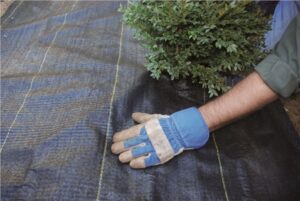
Weed Barrier
Using a weed barrier before spreading mulch is one way to prevent unwanted weeds from growing through and keep your garden beds looking neat for longer. The DeWitt Weed Barrier 12 Year, available in various sizes, provides long-lasting protection, making your mulch job more effective and low-maintenance.
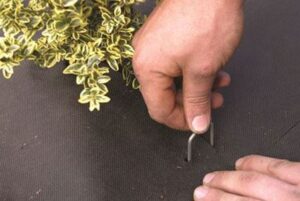
Anchor Pins
DeWitt Anchor Pins securely hold landscape fabrics, weed barriers, and drip irrigation tubing in place, ensuring your mulch stays put. These steel pins are angled for easy installation and provide lasting durability for a professional finish.
 Metal Edging
Metal Edging
Metal edging is essential to create clean, defined lines between your garden beds and lawn. This helps to keep mulch in place and prevents it from spilling into unwanted areas. This gives your landscape a professional, polished look.
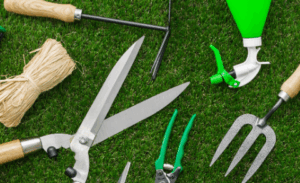
Tools
Proper tools like shovels, rakes, and wheelbarrows make spreading mulch much easier and more efficient. Visit Glover Nursery to stock up on the tools you need to get the job done quickly and effectively.
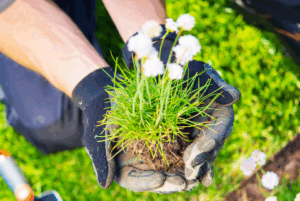
Gloves
Wearing gardening gloves is a must when spreading mulch to protect your hands from dirt and sharp mulch pieces. At Glover Nursery, we offer a variety of gloves to keep your hands safe and comfortable during the job.
FAQ’s About Buying Mulch in Bulk
How big is 1 yard of mulch?1 cubic yard of mulch equals 27 cubic feet. Most bags of mulch are between 1.5-2 cubic feet, so you would need 14-18 bags of mulch for the same volume. |
How much does 1 yard weigh?The weight of 1 cubic yard will vary depending on the product. For example, Soil Pep weighs 700 lbs per cubic yard, while our special Glover Blend weighs 1900 lbs per cubic yard. Rock mulches weigh an average of 2600 lbs per yard! Why does this matter? It depends on whether you are picking it up yourself or having us deliver it for you. If picking up at our store, know how many tons your truck or trailer can hold. |
Should you remove old mulch before mulching?No, you do not need to remove your old mulch before adding fresh mulch. The decomposition process of the mulch is part of why it is so beneficial to your garden. One purpose of mulch is to add organic matter, provide essential nutrients, promote biodiversity in soil microbes, and improve soil aeration for better drainage while still retaining moisture for root access. |
How many inches of mulch is best?In general, the recommendation for weed suppression, regardless of the type of mulch used, is 4″ deep. If weed suppression isn’t your goal, only 2″ or 3″ is needed for helping with moisture retention, soil enhancement, and temperature control. If you go above 4″ with a living mulch (meaning, not made of stone), you will want to keep an eye out for fungal and mold issues. |
Do I need to use Weed Barrier under my mulch?There are different schools of thought on this topic, but in general, they come down to 2 answers.
|

